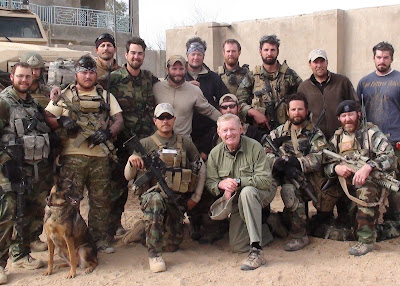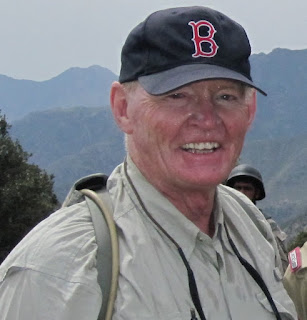Counterterrorism magazine published my Q&A with Bing West, a former combat Marine and author of The Last Platoon: A Novel of Afghanistan.
You can read the Q&A via the below pages or text:
My Q&A With Bing West
A graduate of Georgetown and Princeton Universities, Francis J. “Bing” West fought as a Marine infantry officer in the Vietnam War and later served as Assistant Secretary of Defense for International Security Affairs under President Reagan. He is also the author of best-selling books about war and the Marine Corps.
His books include
“The Village,” which has been on the Marine Commandant’s Reading List for 40
years; “The Strongest Tribe: War, Politics, and the Endgame in Iraq,” “The
Wrong War,” a history of the Afghanistan war, “Call Sign Chaos: Learning to
Lead,” written with General James Mattis, and his current novel, “The Last
Platoon: A Novel of the Afghanistan War.”
He was awarded the Public Service Award and the
Department of Navy’s Distinguished Civilian Service Medal. He is also the
recipient (twice) of Marine Corps Heritage, the Colby Military History Award, the General Goodpaster
Prize for Military Scholarship, the Free Press Award, the Father Clyde Leonard
Award, the Marine Corps Russell Award for Leadership, and the Veterans of
Foreign Wars National Media Award.
He has covered
numerous wars as a combat correspondence and his articles have appeared in The
Wall St. Journal, The New York Times, The Atlantic, The National Review, The
Washington Post and other publications.
He is a member of the
Hoover Military Historians Working Group at Stanford University, the Council on
Foreign Relations and the Infantry Order of St. Crispin.
He was interviewed by
Paul Davis.
IACSP: How would you describe your excellent novel about
the war in Afghanistan, “The Last Platoon?”
West:
“The Last Platoon” is my effort to tell a story so the reader understood the
complexity and the tragedy of Afghanistan. I set out to do a metaphor for the
entire war. I tried to show what a captain on the ground was doing, how his
ambitious colonel wanted him to change, and how out of touch the White House
and the Secretary of Defense were with what was going on the ground. And how
the Taliban were tied into the drug dealers, including Pakistan. I pulled all
those threats together and tried to show the real chaos of a tough firefight.
IACSP: I liked how you went from the White House down to
a Marine captain and the sergeants. I particularly like your portrayal of the
ambitious and incompetent colonel. I’m a Navy veteran and a retired Defense
Department civilian, and I once worked for this awful Air Force colonel, in a
noncombat situation, and I saw him in your character.
West:
Actually, the colonel in the book was my colonel in Vietnam. Other grunts who
read the book have written to me and said we finally nailed that son of a
bitch. Everyone in the unit knew who he was.
IACSP: Is he alive? Has he responded to your negative
portrayal of him?
West:
No. But in my other books, “The Wrong War,” and “One Million Steps,” I have had
the generals respond to me sharply, saying, you know tactics, but you don’t
know operations or strategy. I responded back to them and said, you lost the
war. So don’t tell me about not understanding operations and strategy.
IACSP: Yes, but didn’t politics play a significant role?
West:
I have a different view. All the way until the end, the presidents deferred to
the generals. President Bush loved them. President Obama was exasperated, but
he did not contradict the generals. He shortened the timeline, but he did not
contradict the strategy they were trying to lay out – nation building.
President Obama complained about it, but he didn’t take concrete actions to
make a difference. Finally, I would argue, beginning with General Dunford, our
military got it right. They cleared the decks and just kept a small number of
special operators to conduct raids and bombed the daylights out of the enemy
and gradually trained the Afghan army.
The
tragedy to me was we finally got it right in 2020 and then we have two
presidents who dislike one another viscerally but have one thing in common.
Both President Trump and President Biden wanted nothing to do with Afghanistan
and understood nothing about it. They were both equally stubborn. At the time
when we finally had it right, two presidents gave up on it because it had been
going on too long.
IACSP: Did the way we pulled out of Afghanistan hit you
like a gut punch? To me, it felt like Vietnam all over.
West:
It was a shame and disgrace to our country. President Biden asked what our
interest was there? My answer is, we had Bagram Air Base, which was huge, and
it was in the backyard of Russia, Iran and China. Therefore, the Iranians, the
Russians and the Chinese always had to be looking over their shoulders, because
we could see what they were doing. We had a fantastic base and President Biden
gave it up for no reason.
IACSP: You mentioned nation building, and I’ve read in
your published articles that you think the military ought not to be involved in
nation building.
West:
The military changed its doctrine in 2005 to say our soldiers will be nation
builders as well as warriors. From 2005, I have argued strongly against that.
It diverted us and it led to shambles both in Iraq and Afghanistan. It was the
wrong call by our generals.
IACSP: Nation building worked in Japan, Germany and South
Korea, why didn’t it work in Iraq and Afghanistan?
West: Nation building worked in Japan, Germany and South Korea because we dictated who all the leaders were going to be, and we stayed there. We’re still there. We went many decades being the power behind the throne. I believe the American political landscape in the 21st Century would not tolerate us staying the way we stayed in South Korea for years to build the nation the right way. We simply would not have the patience. Therefore, I believe we would not do what we did in South Korea. I was opposed to nation building. I didn’t believe the body politic would stick with it.
IACSP: What is your view of the airlift operation from
Kabul in comparison to the airlift operation from South Vietnam in 1975?
West:
I was the special assistant to Jim Schlesinger, the Secretary of Defense, in
1975. He was a wonderful man. Long before Saigon fell, he ordered a full
airlift for as many South Vietnamese as possible before our forces left. People
don’t recognize that, but he did that for a month. In the case of Afghanistan,
our Secretary of Defense and Chairman of the Joint Chiefs of Staff did nothing.
The facts are damning.
We
all knew for many years that the State Department was incompetent in terms of
approving the visas. When President Biden declared in April that he was going
to pull everyone out, there were 18,000 visas in the State Department system.
In July, six months later, there were still 18,000. No movement in six months.
General Miley says, well, we didn’t expect Kabul to fall in a month. My point
is our military did nothing for six months before that, so the idea that they
are going to say they believed that given another six months, they would have
gotten everyone out, is deceitful. The evidence was clear for six months and
they hadn’t done a damn thing.
IACSP: Prior to President Biden, what is your view of
President Trump’s withdrawal plan and agreement with the Taliban?
West:
I believe that President Trump had some good policies and a terrible character.
He was so emotional that you couldn’t predict what he was going to do. What he
was doing in Afghanistan was as wrong as what President Biden did. We have no
way of knowing what President Trump would have done, as he wasn’t reelected.
For President Biden to blame President Trump is passing the buck. This was
President Biden’s decision and no one else. No one in the military supported
it. But on the other hand, no one in the military resigned. General Mattis
resigned when he disagreed with President Trump
IACSP: I never met President Trump, but from what I’ve
read about him, your portrayal of the president in “The Last Platoon” was spot
on.
West:
Thank you. Our politicians are strange ducks to begin with. I don’t cut any of
them any slack, and I certainly didn’t in the book.
IACSP: Do you think we will see an increase in terrorist
attacks now that terrorist groups can regroup in Afghanistan? And do you think
we will be returning to Afghanistan in the future?
West:
I have no crystal ball. There are too many variables there. The Taliban is a
cancer inside Afghanistan. Al- Qaeda would like to be a pandemic far beyond
Afghanistan, but the Taliban would like to stay just where they are. Al-Qaeda
are the ones that would try to hit Western Europe and the United States. I
think it is too early to predict. But I’m not an intelligence expert, I was a
warrior. I just as soon kill them and be done with it.
IACSP: One other thing I liked in “The Last Platoon” was
your description of Afghan heroin dealing.
West:
When I was in Afghanistan, we all knew what was occurring with the Taliban and
drug trafficking. Both Iran and Pakistan profited immensely.
IACSP: Thank you for your service and thank you for
speaking to us.








No comments:
Post a Comment